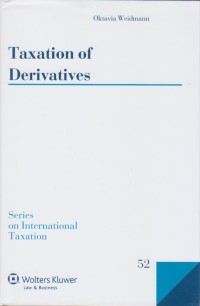
Book
Taxation of Derivatives
The exploding use of derivatives in the last two decades has created a major challenge for tax authorities, who had to develop appropriate derivatives taxation rules that strike a balance between allowing capital markets to function effectively by removing artificial tax barriers and at the same time protecting their countries’ tax base from tax avoidance schemes that utilise these instruments. Derivatives exist in a vast variety and complexity and new forms or combinations of existing forms appear ad hoc as new risk categories emerge and companies seek to invest in or hedge these risks. This very thorough book discusses and analyses taxation issues posed by derivatives used in domestic as well as in cross-border transactions. In great detail the author presents approaches that can be adopted by tax legislators to solve these problems, clarifying her solutions with specific reference to components of the two most important domestic tax systems in relation to derivatives in Europe, those of the United Kingdom and Germany. Examples of derivatives transactions and arbitrage schemes greatly elucidate the nature of derivatives and how they can be effectively taxed. The following aspects of the subject and more are covered: basic economic concepts in the context of derivatives such as replication, put-call-parity, hedging and leverage; designing a suitable definition of derivatives in domestic tax law; achieving coherence in domestic tax rules by applying a ‘special regime approach’ versus an ‘integrative approach’ and the distinction of income and capital, equity and debt; alignment of accounting standards and taxation rules and the application of fair value accounting for tax purposes; how to tax hedged positions and post-tax hedging schemes; taxation of structured financial products and hybrid instruments with focus on bifurcation and integration approaches and the recent BEPS discussion drafts on hybrid mismatch arrangements; refining the ‘beneficial ownership’ – concept in domestic law and in tax treaties and an analysis of recent case law; withholding taxes in the context of domestic and cross-border dividend tax arbitrage schemes; and tackling derivatives tax arbitrage effectively in anti-avoidance legislation. By providing an in-depth analysis of corporate taxation issues that arise in domestic as well as in cross-border derivatives transactions, this book is not only timely but of lasting value in the day-to-day work of tax lawyers and tax professionals in companies, banks and funds, and is sure to be of interest to government officials, academics and researchers involved with financial instruments taxation.
Detail Information
| Call Number |
42 TAX okt
|
|---|---|
| Publisher | Wolters Kluwer Law & Business : The Netherlands., 2015 |
| Collation |
xxviii, 408 p.; 24.6 cm
|
| Language |
English
|
| Classification |
42 TAX okt
|
| ISBN/ISSN |
9789041159779
|
| Edition |
-
|
| Subject(s) |






